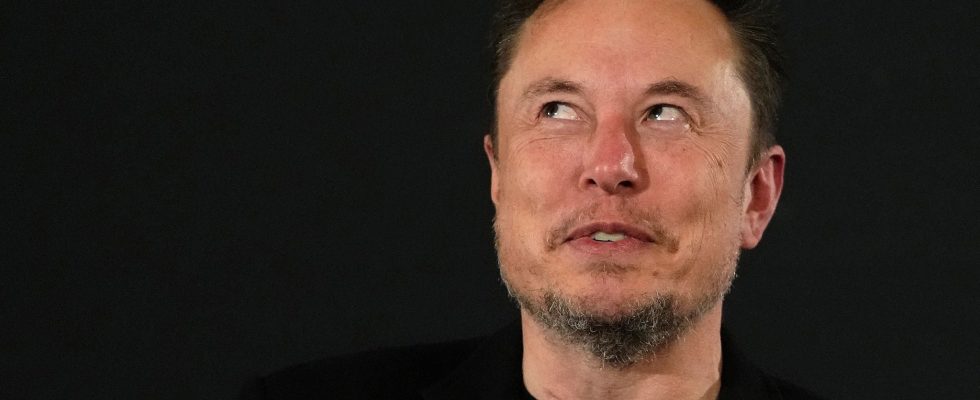On November 27, it was possible to listen live on X (formerly Twitter) to a twenty minute interview between American entrepreneur Elon Musk, who acquired the platform more than a year ago, and Israeli Prime Minister Benjamin Netanyahu. Let us measure the importance of the phenomenon: nowadays, a head of state, who is also in the middle of a war, prefers to address, to broadcast a long message, the owner of the social network favored by CSP + and opinion makers rather than any other media.
We certainly need to put this conversation in context. After Musk acquiesced to a anti-Semitic post published on Xlarge American companies such as Walt Disney, Warner Bros Discovery and Comcast have suspended until further notice their advertisements on the social network. Some commentators suggest that by visiting Israel, declaring that he would commit to stopping the “spread of hatred” on X and believing that the destruction of Hamas, Israel’s war objective, was essential, the Tesla executive sought to make amends.
The significance of the episode nevertheless seems broader. Because the billionaire is not his first attempt in this area. In May 2023, X hosted the live launch (chaotic) from the campaign of Republican primary candidate Ron DeSantis, whom Musk supports. At the beginning of November, during a summit dedicated to AI organized by the British government, it was the Prime Minister himself, Rishi Sunak, who served as a foil to the richest man in the world during ‘a long discussion. In a word, sometimes interviewer, sometimes interviewed, sometimes both at the same time as the border turns out to be blurred, Musk deals as an equal with the most powerful leaders on the planet.
We can see this as one case among others of the influence of the business world in politics. We know well that CEOs, for reasons that are sometimes understandable, sometimes not justifiable, have easier access to political leaders than anyone else, and that globalization has greatly expanded their empire. However, in the case of Musk, the issue is of another dimension since X is a global media with disproportionate real effects. Furthermore, the entrepreneur’s visit to Israel apparently served him, in passing, to obtain an agreement in principle on the use of Starlink satellite units, another of his companies, in the Gaza Strip, which Israel initially refused. To put it another way, at the same time owner of a very influential social network, the most followed member of the latter (before Obama) and founder of leading technological companies, the billionaire is simultaneously press boss, journalist and salesman, which turns out to be unprecedented. As a result, while he has no official political responsibility, he has an influence on the life of the city significantly greater than that of most world leaders who now depend on his good graces, and make us depend on them. at the same time.
Each Internet user looks like a Gafam vassal
This power relationship, which we find to a lesser extent among other Gafam bosses, recalls the political system that was feudalism, in which institutions and customs linked “suzerains” and their “vassals”. The “suzerain” allocated fiefs to his followers, members of the warrior aristocracy, in order to protect his domain. They themselves had other vassals, the smallest of them having only “serfs” attached to their land. In exchange for this fief and the protection granted by the overlord, the vassal owed him “faith and homage”. Each user of the Internet and social networks, from this perspective, resembles a vassal of Gafam, who allocate us a meager media space and why not a quarter of an hour of fame in exchange for our personal data, free of charge, from which they extract an annuity – a relationship that the economist Cédric Durand called, in an eponymous work, the technofeudalism. The heads of state, for their part, constitute the top of the basket of vassalage since they can benefit, when they get along well with the leaders of the platforms, from a large audience. By a strange paradox, this new feudalism happens to be the product of contemporary capitalism, even though feudal relations have been abolished by the capitalist rupture.
It happens that the feudal relationship is reversed. Musk traveled to Israel out of fear of the economic fallout from his questionable tweet. As commented Nassim Nicholas Taleb on X, it’s “further proof that if you depend on advertisers, you will never be truly free even if you are insolently rich.” In this case, the recent withdrawal of advertisers only aggravates a very tense situation for the platform since, since its purchase by the entrepreneur, its advertising revenues have fallen. X promoting particularly broad freedom of expression, companies complain that their advertisements are juxtaposed with racist or anti-Semitic posts. In response, on November 29, Musk apologized for his sulphurous post while telling advertisers “to go fuck yourself”. But it was the same in the feudal era since the same lord could be suzerain for certain fiefs and vassal for others.
The problem posed by this new feudalism is twofold. Not only does it go hand in hand with a concentration of economic power, but it amalgamates two spheres that the liberal idea has never ceased to want to separate, the political and the economic. The liberal project, in fact, aims at the greatest possible dispersion of power and, at best, as the philosopher formulated Michael Walzer, the separation of “spheres of justice”. From this perspective, no superiority in one sphere should be able to confer superiority in another. In other words, economic power should not grant political power, and vice versa. Our societies have never achieved this ideal, which is undoubtedly unrealistic, but they consider that we must get closer. Or at least they still considered it until the tech moguls experienced their spectacular rise. Is it desirable for us to be dependent on a few one-man bands?
.
